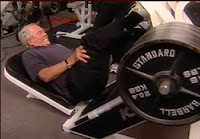Don't Judge A Website By Its Title

 When one delves a little more into this internet scam, (as the Atheologist did), one finds that it is actually an atheist website in disguise. Its atheist director, Ralph F. Wilson, (if that is his real name and picture, the, ‘F’, probably stands for fibber), has hidden amongst the seemingly innocent stories and articles, one page which lets the cat out of the bag. It is entitled, “Ten Tips for Raising a Darling Heathen Child”. The Atheologist has reprinted it in its entirety:
When one delves a little more into this internet scam, (as the Atheologist did), one finds that it is actually an atheist website in disguise. Its atheist director, Ralph F. Wilson, (if that is his real name and picture, the, ‘F’, probably stands for fibber), has hidden amongst the seemingly innocent stories and articles, one page which lets the cat out of the bag. It is entitled, “Ten Tips for Raising a Darling Heathen Child”. The Atheologist has reprinted it in its entirety:by Dr. Ralph F. Wilson
Even if you're a klutz at do-it-yourself projects, you'll be able to accomplish this, though don't expect to produce heathen kids overnight. If you can raise your child as a heathen for the first twelve years or so, you'll probably have achieved your goal. Just follow these ten simple steps:
1. Remove prayer from your home. The schools have taken the lead here, so your kids won't expect prayer at meals or at times of family crisis. Just make sure that you never pray in front of your children. If they see you bowing to a higher power it might make them feel somehow weak, inferior--as if they did not control their own destinies.
2. Keep a Bible around. Now this may surprise you. While you must ban prayer, don't ban the Bible. Keep a copy on the shelf--a high shelf. This is how you can appear open-minded while preserving the Bible as a closed book. To keep your kids heathen, however, you must never read to them from the Bible. "Seen not heard," is the safest rule. Bible story books--especially ones with attractive pictures--are dangerous, too. There's a chance your child might pick one up by accident and ask you to read stories out of it. Don't allow one in the house.
3. Plan family events for Sunday mornings. This way your children won't have any excuse for going to church with their friends. Don't let your children hear the phrase "The Lord's Day." Instead, say something like, "Sunday is my only day off," or "Sunday is the only day I get to sleep in," or "Sunday is the only day our family can do things together." Before you know it, your child will be permanently trained to think selfishly about Sunday mornings, and will be very unlikely to be found in church.
4. Try to have your child attend a wedding held in a church. That way your child can never say, "I never went to church when I was a child," like so many children say these days. But be careful. There's a chance he might hear prayers and become confused. It might be better to arrange for him to come to the reception only.
5. Spice up your family vocabulary with occasional references to God damning someone. That'll help the children think God is angry at people and only wants to condemn them. Some families have found it helpful to say "hell" when they're angry so the child will associate it with swearing instead of a real place. Using "Jesus!" and "Christ!" and "God!" as expletives is also quite effective in inoculating your child against the Christian faith.
6. Block Christian broadcasting from your television by reprogramming your VCR's scanning menu or insisting that the cable company doesn't transmit those kinds of stations to your home. Be extra careful, though, to monitor your child's viewing so she doesn't accidentally watch a Billy Graham Crusade or something equally dangerous. A good substitute might be "The Simpsons," or some other character-building cartoons.
7. Don't invite grandparents or other relatives to your home without first making sure they won't talk about Jesus or God. Tell them that all families have rules, and your home is designed to be "religious values neutral." It would also be a big mistake to let your children stay with their grandparents if they are known to engage in any of the above taboo activities. Perhaps the children could meet with Christian grandparents for a supervised visit in a park. But letting your children visit for a day or more is just too risky.
8. Separate moral instruction from religion. It's all right to tell your children the difference between right and wrong, just so long as you don't tell them that God is against stealing or killing or lying. That way it will be easier for them to adopt an "everything is relative" belief system which won't inhibit their lifestyle as teenagers and adults.
9. If your child asks to attend church, tell her proudly that when she is eighteen she can make her own decisions, but while she is in her impressionable years you don't want to expose her to any pressure for or against God. Tell her that you are a politically correct parent. That you believe in separation of church and state, and that you only want what's best for her.
10. Train your child to say "Protestant" when asked his religion. Don't bother to explain it. "Agnostic" or "atheist" or "heathen" might be more accurate, but people could consider you a bad parent. And it's best to avoid using the term "Christian" because it includes the name of Christ in a non-swearing context, which might raise questions in your child's mind.
If you do these things, you can almost be guaranteed a heathen child. You'll have the satisfaction of knowing that when she's in trouble, your daughter won't know how to pray. And she won't have adopted those narrow Christian values either. She won't even have a clue to what "sin" is. She will be able to do almost anything without feeling guilty, so she is likely to be healthy psychologically. And, even if she catches the mildest dose of Christian values, it is certain that she won't be able to transmit the Christian faith to her children. Enjoy. Utterly heathen grandchildren will be a cinch.
You'll notice that nearly anybody can raise a heathen child, almost without trying. Some vigilance is required, however.
If you just can't resist your child pestering you to let him go to church, absolutely refuse to go with him. Drop him off at the door if need be, but don't go in yourself. It is vital that he sees church as something for children only, and that intelligent adults like his parents don't need religion as a "crutch." Be aware, however, that even letting your child in a church could ruin the entire heathen training program. A child who learns about Jesus could become a joyful, happy, values-indoctrinated Christian. He might infect brothers or sisters, as well. Letting your child attend church, even by himself, is much frowned upon by enlightened parents these days.
Now score yourself. Give yourself 10 points for each of the steps you have under pretty good control. If you've racked up at least 40 points, pat yourself on the back. You're well on your way to rearing a darling heathen child.
This kind of intuitive thought and deep investigative skills is what sets apart the Atheologist from his other less significant peers. This finding reminds the Atheologist of the unearthing of another not so honest individual, here, last year.
The Atheologist





